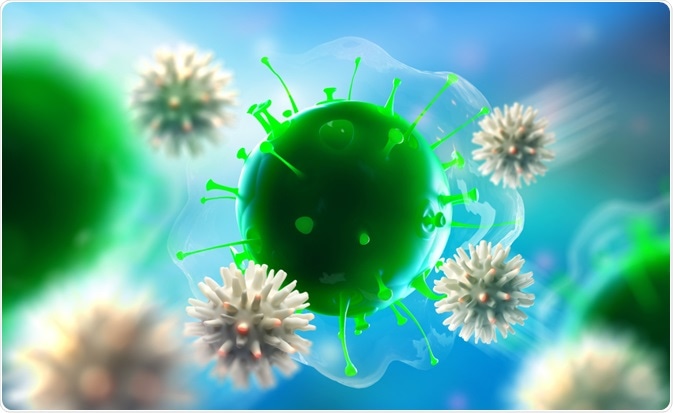The immune system is a defense mechanism against foreign materials potentially causing diseases. Five main types of pathogens can cause infectious diseases; they are viruses, bacteria, fungi, protozoa, and worms. The interplay between the immune system and pathogens is the main area of focus for research to reduce the prevalence and mortality of infectious diseases.
 Immunology of Infectious Diseases" />
Immunology of Infectious Diseases" />
Immune System. Image Credit: Yurchanka Siarhei/Shutterstock.com
Immune system
The human immune system consists of the innate and adaptive immune systems. The innate immune system includes all physical, chemical, and cellular defense against foreign materials. It is a non-specific defense and its purpose is to prevent the spread and movement of pathogens inside the body. It is the first line of defense and has a fast response time of 0-96 hours.
For example, macrophages are cells that can engulf and digest pathogens. Macrophages also present molecular markers on the surface of pathogens called antigens onto the macrophages’ surfaces for activating the adaptive immune response.
The second line of defense is the adaptive immune system. It is only found in vertebrates and generates a specific response against specific pathogens. The adaptive immune system recognizes molecular markers on the surface of pathogens called antigens and generates a response to attack the pathogen. The adaptive immune system is mediated by two main types of white blood cells, T cells and B cells.
When an antigen is recognized, T cells and B cells are activated. The T cells either activate B cells or turn into killer T cells that attack and kill the pathogen. When B cells are activated, antibodies specific to the antigen on the pathogen are produced and secreted. These antibodies then bind to the pathogen to “mark” it for destruction by other immune cells, and neutralize the toxicity and block entry of the pathogen into the human cells. Unlike the innate immune system, the adaptive immune system can generate a long-term response.
A fraction of the antibody-producing B cells can differentiate into memory B cells. These cells and latent and circulate in our system, and can be activated immediately when being exposed to the same pathogen. This offers protection from the same pathogen in the long-term.
Infectious disease prevention
The immune system can be utilized to prevent infection of diseases. A vaccine consists of antigens, usually made from a weakened or killed form of the pathogen, and stimulates the immune system to produce a sufficient level of antibodies. This prepares the body for potential infections and allows rapid elimination of the pathogen once infected.
Not only can vaccination prevent infection of diseases, but it can also eradicate infectious diseases. Smallpox is an infectious disease caused by the Variola virus. When vaccination for the disease was promoted, everyone vaccinated developed an immunity to the virus, leading to the virus having no human host to infect. Since the virus could not survive in the environment without a host, as a result, the world was declared free of the smallpox disease in 1980.
Infectious disease treatment
Antibodies from the immune system can also be used to treat diseases. Antibodies that target the same antigen can be mass-produced and injected into patients to treat infectious diseases. This is called plasma-based therapy. It has been used since the 1918 Influenza pandemic to Ebola outbreaks from 1976 onward. However, only a few treatments have been approved.
Evolution of pathogens
Host immunity is one of the main drivers of pathogen evolution. Although vaccination and the adaptive immune response are efficient in attacking infectious agents, they also contribute to the selective pressure for pathogen evolution.
Mutations arise at random in pathogens. Some of these mutations lead to changes in the surface molecules of the pathogens. As a result, these mutants can escape recognition of the immune system and cause diseases.
References:
- Alberts B, et al. The Adaptive Immune System. In Molecular Biology of the Cell. New York: Garland Science; 2002. https://www.ncbi.nlm.nih.gov/books/NBK21070/ Accessed August 2, 2018.
- Cobey S. (2014). Pathogen evolution and the immunological niche. Annals of the New York Academy of Sciences, 1320(1), 1–15. https://doi.org/10.1111/nyas.12493
- Henderson, D. A. (2011). The eradication of smallpox – An overview of the past, present, and future. Vaccine, 29, D7-D9.
Further Reading